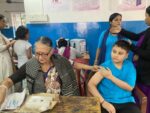| Hypertension likely to affect one-third of the population by 2020
Inactivity and unhealthy food patterns can complicate the situation New Delhi, 21st December 2018: Exercise might be as effective as blood pressure medications in lowering systolic blood pressure below 140 mm Hg, indicates a recent study. An exercise regimen could reduce the need for blood pressure lowering medications in the future. he systolic blood pressure is the pressure exerted by the heart while pumping blood out of the heart by contraction of the heart muscles. It represents the top value in a blood pressure reading. Hypertension is defined as a repeatedly elevated blood pressure exceeding 140/90 mmHg. It is emerging as one of the major lifestyle disorders today. As per estimates, about one-third of the Indian population will suffer from the condition by 2020. Current studies put the prevalence of hypertension at 20% to 40% in urban areas and 12% to 17% in rural areas. Speaking about this, Padma Shri Awardee, Dr KK Aggarwal, President, HCFI, said, “The prevalence of hypertension in Indian adults has shown a drastic increase in the past three decades in urban as well as rural areas. It is important to get an annual checkup done after the age of 30 even if you have no family history of hypertension, are not diabetic or don’t have any other lifestyle-related disorder. For those in the high-risk category, a checkup is advised every month. Hypertension can be prevented provided a person makes necessary lifestyle changes right at the outset. It is also imperative to spread the message of prevention and encourage people across various age groups to check their blood pressure at regular intervals.” Some signs and symptoms of hypertension include dizziness, shortness of breath, headaches, fatigue, and sometimes chest pain, palpitations, and nosebleeds. Adding further, Dr Aggarwal, who is also the Group Editor-in-Chief of IJCP, said, “High blood pressure imposes an up-front burden in people who know they have it and who are working to control it. It adds to worries about health. It alters what you eat and how active you are, since a low-sodium diet and exercise are important ways to help keep blood pressure in check. Some people need medication and may need to take one or more pills a day, which can be a costly hassle.” Some tips from HCFI. • Achieve and maintain a healthy weight for your height • Exercise regularly • Eat a diet that is rich in fruits, vegetables, and whole grains • Limit sodium intake to under 2,300 milligrams a day (one teaspoon of salt) and get plenty of potassium (at least 4,700 mg per day) from fruits and vegetables • Drink alcohol in moderation, if at all • Reduce stress • Monitor your blood pressure regularly, and work with your doctor to keep it in a healthy range
|
Hypertension likely to affect one-third of the population by 2020





